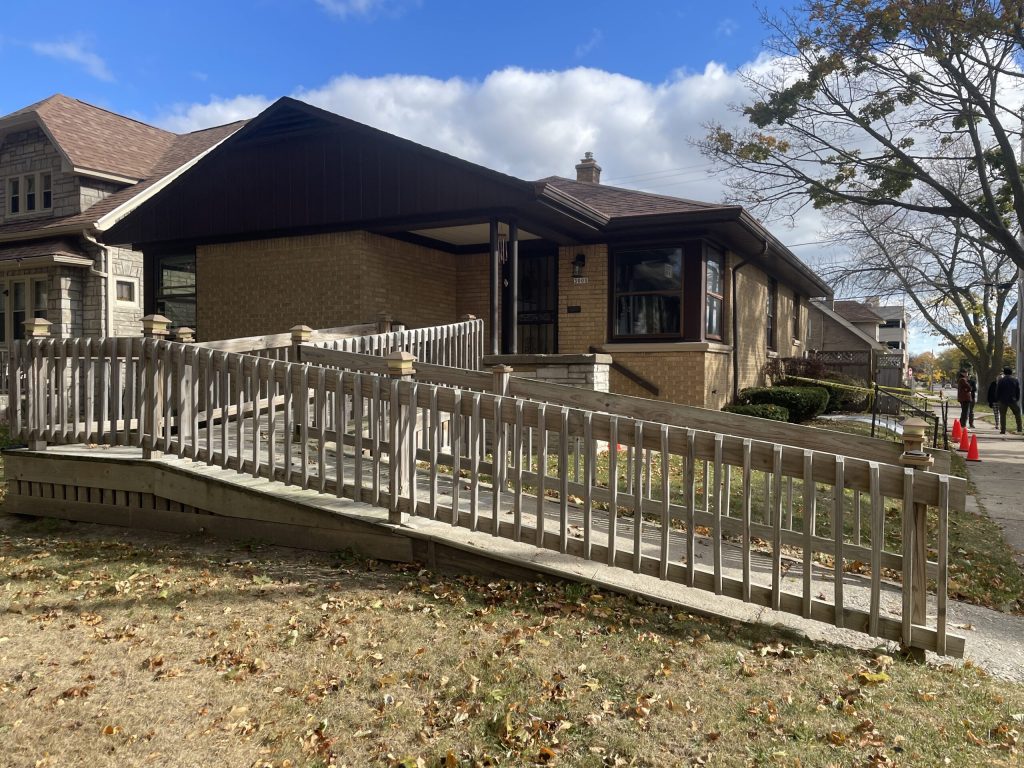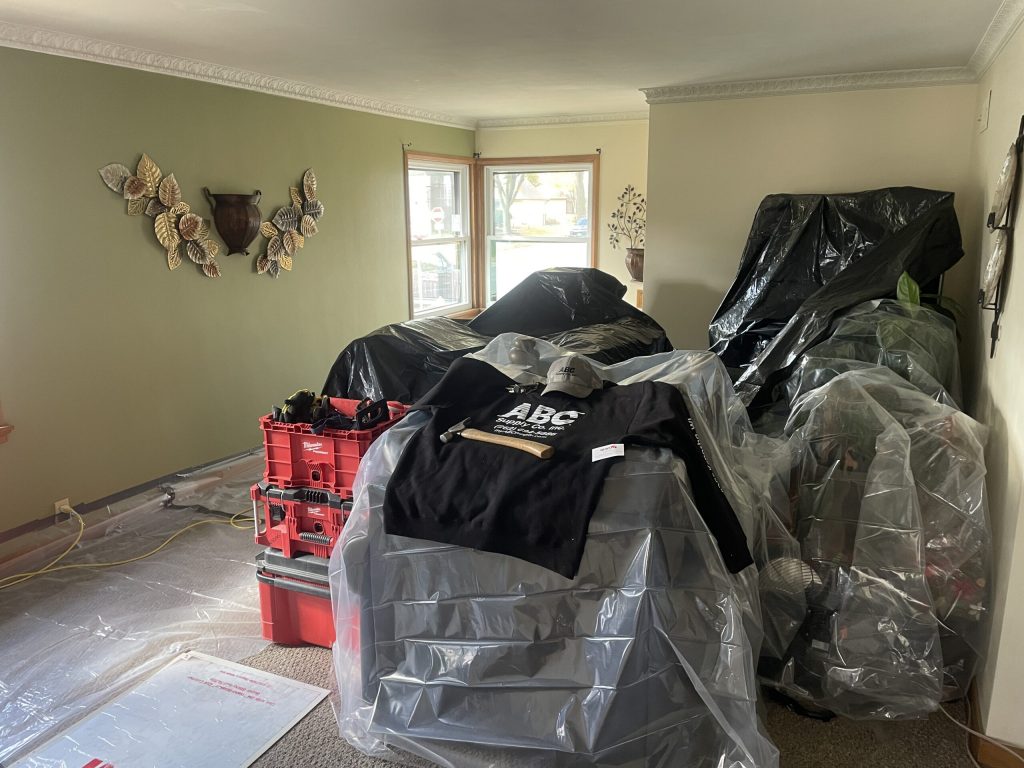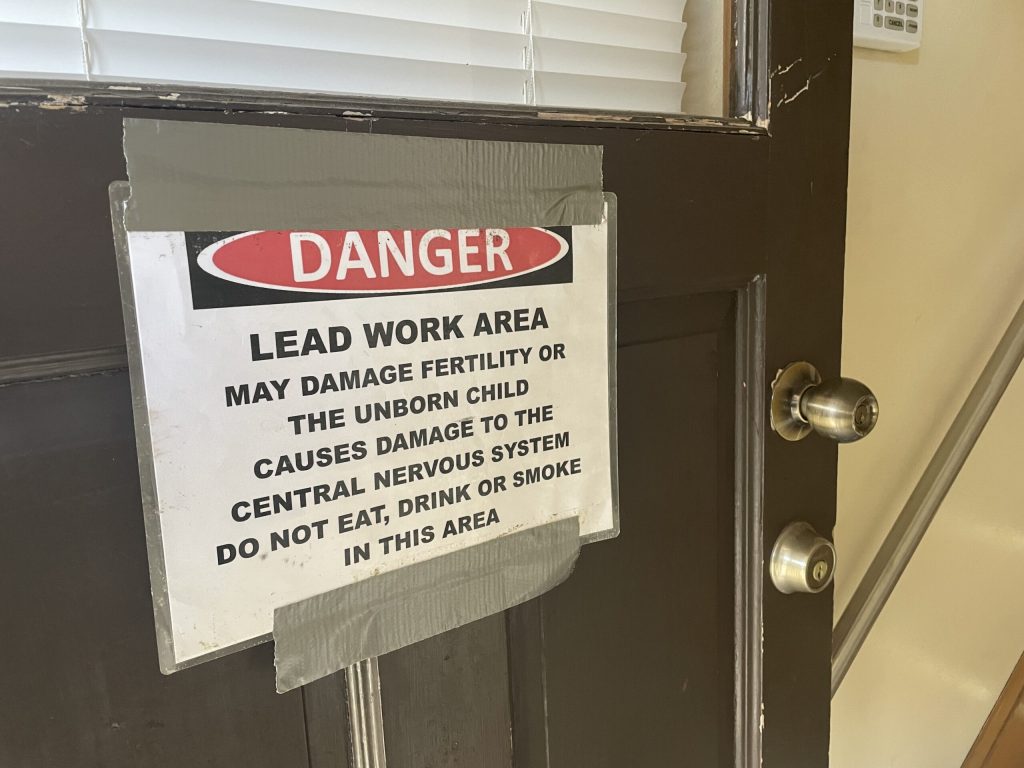Milwaukee Adopts New Policy Requesting More Lead Testing For Children
Officials stress importance of wider testing, stronger enforcement against noncompliant landlords

Lead abatement repairs are taking place at this house on Milwaukee’s North Side on Oct. 23, 2024. Nick Rommel/WPR
Denise Morris was living with her grandchildren in a 1910-built house on the North Side of Milwaukee when she got a flyer in the mail. It was about Habitat for Humanity’s lead abatement house repair program.
To take advantage of the program, her grandchildren had to get blood tests to check for lead poisoning.
At levels of 3.5 micrograms, the Milwaukee Health Department connects families with caseworkers and nurses. At 10, it requires lead abatement repairs inside the home.
Contractors spent three months rehabbing Morris’ house. She also learned that eating foods rich in iron and calcium can reduce children’s blood lead level.
“I bet you they’re tired of anything green. I just introduced them to broccoli, and they love it with cheese now,” she said, adding that her grandchildren are at a “good level” of lead now.
On Wednesday, adding to existing state guidelines, Milwaukee’s Health Department started advising parents to get their kids’ blood lead level tested at 12, 18 and 24 months, and then annually through age 5.
“We have over 2,000 children a year that test positive in the city of Milwaukee, at 3.5 micrograms a deciliter and above,” said Tyler Weber, deputy commissioner of the department’s Environmental Health Division.
Lead poisoning has different symptoms depending on age. Children with high levels of the toxin often develop more slowly or have trouble learning. Adults may experience pains, memory difficulty or high blood pressure.
According to the Milwaukee Health Department, lead abatement repairs come at no cost to residents, and blood tests are fully covered by most health insurance plans, including Medicaid. Weber said most families get tested with their primary care doctor.
“We can’t fully grasp the extent of the lead poisoning crisis in Milwaukee unless we’re getting more children tested,” he said.

Lead batement work is in full swing at a house on Milwaukee’s North Side on Oct. 23, 2024. Nick Rommel/WPR
Absentee landlords can be a stumbling block to abatement work
Federal funding has allowed Milwaukee to repair many owner-occupied houses at no cost to the homeowner.
But 80 percent of the families his department works with are renting their home, according to Weber.
“Some landlords are great to work with and some are very difficult,” he said.
He added that some landlords evict lead-positive tenants before rehab work can begin.
The Health Department orders landlords to hire lead abatement contractors within 30 days of notice. Depending on their incomes, landlords either have to pay out-of-pocket or apply for government grants with the department’s help.
Some landlords don’t comply at all — so the department has upped its “reinspection” fee for those property owners.
“We’ve escalated our enforcement strategy to try to go after those and target them,” Mannan said. “We certainly don’t want our federal funds, our HUD funds, our ARPA funds to go to those types of landlords that own multiple properties that poison multiple kids.”
Mannan said his office is working with the federal Department of Justice to begin criminally prosecuting noncompliant landlords next year.

A sign on the back door of a house on Milwaukee’s North Side warns of lead abatement work on Oct. 23, 2024. Nick Rommel/WPR
Lead abatement a problem of scale
Around 200,000 housing units in Milwaukee may contain lead paint.
“It’s really hard on low-income communities and communities of color,” Weber said, attributing the divide to historical redlining and segregation.
“We’re looking at hundreds of millions of dollars to actually scale it up and do all the homes,” Mannan said. That money primarily comes from the federal Department of Housing & Urban Development, plus American Rescue Plan Act appropriations.
“Fifteen micrograms per deciliter — we’re literally telling people ‘Hey, we’re waiting for your brain to get damaged before we statutorily do a response’,” Mannan said.
He said that while there are enough certified contractors in the city, funding is still too scant to permanently lower the benchmark for abatement.
There is no safe blood lead level for children, according to the CDC.
The federal agency also says that, nationally, blood lead levels have been declining for the last few decades, attributing the trend to control efforts by governments, health care providers and local communities.
Milwaukee Health Dept. says kids should be tested for lead poisoning more often was originally published by Wisconsin Public Radio.
If you think stories like this are important, become a member of Urban Milwaukee and help support real, independent journalism. Plus you get some cool added benefits.
More about the Lead Crisis
- Rep. Madison Proposes Restoring Local Control Over Lead Inspections - State Rep. Darrin Madison - Jan 6th, 2026
- $43 Million Later, MPS Says Classrooms Are Safe From Lead Dust - Corrinne Hess - Dec 18th, 2025
- MPS Buildings Cleared of Lead-Paint Risks after 10-Plus Months of Work - Milwaukee Public Schools - Dec 17th, 2025
- Wisconsin Moves to Require Lead Service Lines Replaced By 2037 - Danielle Kaeding - Dec 11th, 2025
- Gov. Evers, DNR Announce More Than $159 Million to Ensure Clean, Safe Drinking Water for Wisconsinites in 29 Municipalities - Gov. Tony Evers - Dec 10th, 2025
- EPA Announces $3 Billion in New Funding for States to Reduce Lead in Drinking Water - U.S. Environmental Protection Agency - Nov 25th, 2025
- Wisconsin Communities Get $282 Million for Drinking Water Projects - Danielle Kaeding - Nov 19th, 2025
- MKE County: County Launches Lead Abatement Program - Graham Kilmer - Nov 9th, 2025
- Milwaukee County Launches Lead Remediation Program to Reduce Lead-Based Paint Hazards in Homes in Suburban Communities - David Crowley - Nov 5th, 2025
- Wisconsin Improves Child Lead Testing Rates, Urges Continued Testing and At-Home Prevention - Wisconsin Department of Health Services - Oct 21st, 2025
Read more about Lead Crisis here




















